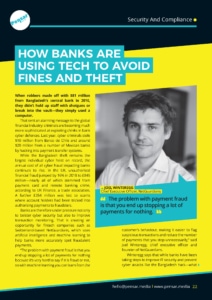Security and Compliance
HOW BANKS ARE USING TECH TO AVOID FINES AND THEFT
When robbers made off with $81 million from Bangladesh’s central bank in 2016, they didn’t hold up staff with shotguns or break into the vault—they simply used a computer.
That sent an alarming message to the global financial industry: criminals are becoming much more sophisticated at exploiting chinks in bank cyber defences. Last year, cyber criminals stole $10 million from Banco de Chile and around $20 million from a number of Mexican banks by hacking into payment transfer systems.
While the Bangladesh theft remains the largest individual cyber heist on record, the annual cost of all cyber fraud impacting banks continues to rise. In the UK, unauthorised financial fraud jumped by 16% in 2018 to £84 million—nearly all of which stemmed from payment card and remote banking crime, according to UK Finance, a trade association. A further £354 million was lost to scams where account holders had been tricked into authorising payments to fraudsters.
Banks are therefore under pressure not only to bolster cyber security but also to improve transaction monitoring. That is creating an opportunity for fintech companies such as Switzerland-based NetGuardians, which uses artificial intelligence and machine learning to help banks more accurately spot fraudulent payments.
"
The problem with payment fraud is that you end up stopping a lot of payments for nothing.






